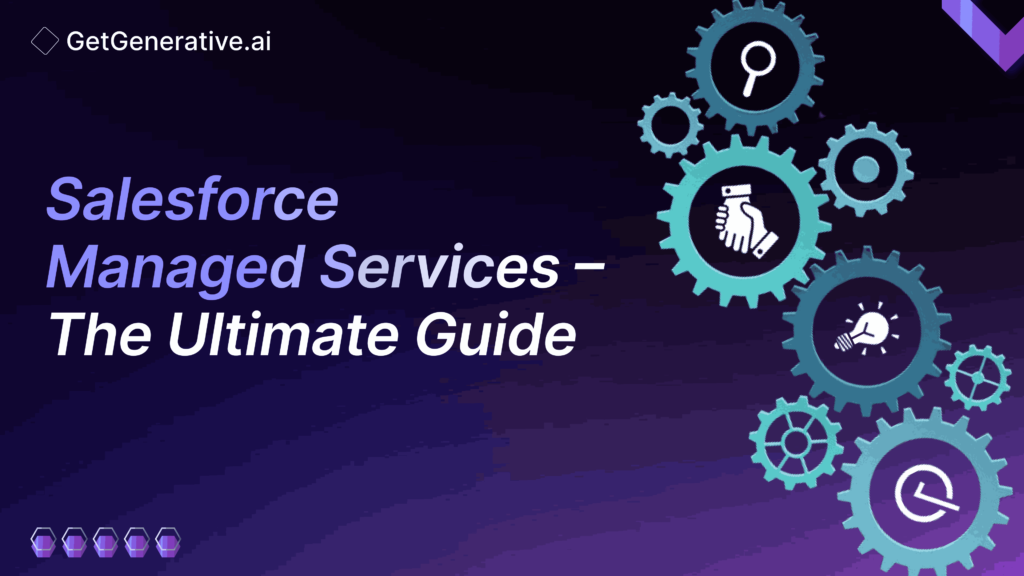Salesforce Managed Services – The Ultimate Guide
Salesforce has become the #1 customer relationship management (CRM) platform and the world’s #4 employer on the Fortune 100 list, with around 80,000 employees and 150,000 product users worldwide. By hiring specialized teams, organizations can save up to 40% on operational costs while achieving faster deployment and enhanced user support.
This proactive strategy ensures continuous improvements and real-time issue resolution, making it a smart choice for businesses looking to stay competitive in today’s fast-paced market.
What are Salesforce Managed Services?
Salesforce Managed Services involves hiring a specialized team to manage the day-to-day operations of your Salesforce application or CRM environment. Unlike Salesforce Consulting Partners, who focus on the initial implementation and handover, Managed Services providers offer continuous support, proactive improvements, user assistance, and ongoing enhancements to your entire Salesforce platform.
This approach ensures that your Salesforce investment is maximized, addressing real-time issues and setting up your organization for future growth.
Why Do Companies Need Salesforce Managed Services?
Cost-Effectiveness
The cost of Managed Services varies based on the type of vendor. Consulting Partners typically charge higher hourly rates than Independent Salesforce Consultants. Managed Services teams usually charge between $100/hour to $140/hour, depending on the required skill sets and seniority of Salesforce professionals.
Proactive User Administration
Managed services providers are an extension of your internal team that is deeply involved in your daily business operations. They provide user training, develop comprehensive project roadmaps, align application strategies with business goals, and lead change management efforts. This proactive approach transforms your Salesforce platform into a revenue-generating asset rather than merely fixing bugs.
Identifying New Functionalities and Features
Managed Services vendors are your de facto Salesforce Support and Subject Matter Experts. They help identify additional Salesforce Clouds (e.g., Sales Cloud, Marketing Cloud), custom Salesforce apps, automation workflows, and evolving business processes to ensure your Salesforce solution keeps pace with your business needs.
Cost of Managed Services
The cost of Managed Services varies based on the type of vendor. Consulting Partners typically charge higher hourly rates than Independent Salesforce Consultants. Managed Services teams usually charge between $100/hour to $140/hour, depending on the required skill sets and seniority of Salesforce professionals.
How Salesforce Managed Services Enhance Efficiency
Streamlined Operations
- Centralized Management: A single team oversees all Salesforce-related tasks, ensuring consistency and reducing communication gaps.
- Automated Processes: Implement custom automation workflows that enhance productivity and reduce manual work.
Expert Guidance
- Dedicated Support: Access to a team of Salesforce experts who provide tailored solutions and strategic advice.
- Continuous Training: Ongoing user training sessions to keep your team up-to-date with the latest Salesforce features and best practices.
Also Read – Salesforce Einstein Language – Unlocking Advanced NLP Capabilities
Evaluating the Need for Salesforce Managed Services
Assessing Current Capabilities
- Internal Resource Limitations: Determine if your in-house team has the bandwidth and expertise to manage Salesforce effectively.
- Business Growth and Scalability: Consider if your current setup can scale with your business needs without compromising performance.
Cost-Benefit Analysis
- Financial Considerations: Compare the costs of hiring a managed services team versus maintaining a full-time in-house team.
- Long-Term ROI: Evaluate the potential return on investment through improved efficiency, reduced downtime, and enhanced system performance.
How the Managed Services Process Works
- Kickoff Call: This call will begin with a high-level introduction to your Salesforce org, current support services, and evaluation of ongoing needs.
- Hand-Selected Expertise: Choose a Project Lead with specific industry knowledge and experience with Salesforce products to oversee requirements gathering and provide Managed Services recommendations.
- Scoping Requirements: Define the roles needed (Salesforce Admins, Business Analysts, Developers, Architects) and build a talent pipeline, submitting profiles and coordinating interviews.
- Seamless Integration: Manage the full onboarding process, with work starting immediately. Flexible, customizable packages are available with no minimum commitment, allowing adjustments based on evolving needs.
Related Read – Top Salesforce AI Tools – The Ultimate Guide
Conclusion
Salesforce Managed Services offer a strategic advantage for businesses looking to maximize their CRM investment. By leveraging specialized teams, companies can achieve significant cost savings, faster deployments, and proactive support, ensuring their Salesforce environment remains efficient and up-to-date. This continuous, expert-driven management transforms Salesforce from a simple tool into a powerful, revenue-generating asset that adapts to evolving business needs.
Simplify your consulting work with GetGenerative.ai. Quickly create great proposals, so you can spend more time offering top-notch service to your clients.
Begin today and improve your workflow.
Frequently Asked Questions (FAQs)
1. What are Salesforce Managed Services?
It’s hiring a specialized team to continuously manage and optimize your Salesforce platform.
2. How do Managed Services differ from Consulting Partners?
Managed Services offer ongoing support and improvements, while Consulting Partners focus on initial implementation.
3. Why should I consider Salesforce Managed Services?
They are cost-effective, provide proactive user administration, and help identify new features to enhance your CRM.




